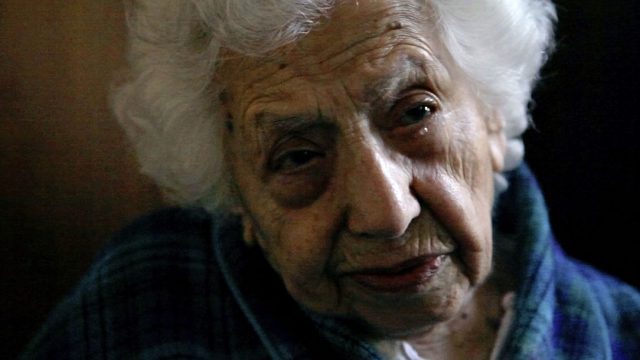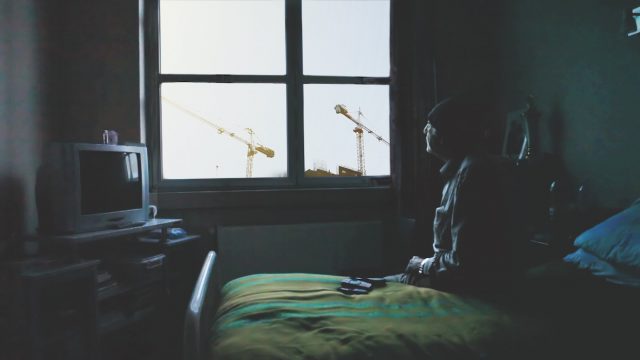
Selma tells the heartbreaking story of her family during the Armenian genocide in Distant Constellation
DISTANT CONSTELLATION (Shevaun Mizrahi, 2018)
Metrograph
7 Ludlow St. between Canal & Hester Sts.
Opens Friday, November 2
212-660-0312
metrograph.com
grasshopperfilm.com
 Shevaun Mizrahi’s debut feature, Distant Constellation, is a lovely, intimate portrait of a group of residents at an old age home in Istanbul who just go about their business or share deeply personal stories while major construction outside tears down the past to build a future the senior citizens will not be a part of. Two men spend much of their day going up and down in the elevator, making fun of each other, talking about aliens, and not wanting to be bothered by anyone else. A man is delighted to bring in halvah. A photographer who now can barely see repeats words and phrases as he tries to fix his flash. A man sleeps in a coffinlike bed, coughing, gasping, and singing as the wind whistles through the window. A woman tells the heart-wrenching tale of what she and her family went through during the Armenian genocide of 1915. And another man talks about his unending passion for sex and eroticism, reading passages from Vladimir Nabokov’s Lolita. There’s a lot of napping and sitting, staring into nothingness and watching television. Snow falls lightly from the sky. A flock of birds fly near giant cranes.
Shevaun Mizrahi’s debut feature, Distant Constellation, is a lovely, intimate portrait of a group of residents at an old age home in Istanbul who just go about their business or share deeply personal stories while major construction outside tears down the past to build a future the senior citizens will not be a part of. Two men spend much of their day going up and down in the elevator, making fun of each other, talking about aliens, and not wanting to be bothered by anyone else. A man is delighted to bring in halvah. A photographer who now can barely see repeats words and phrases as he tries to fix his flash. A man sleeps in a coffinlike bed, coughing, gasping, and singing as the wind whistles through the window. A woman tells the heart-wrenching tale of what she and her family went through during the Armenian genocide of 1915. And another man talks about his unending passion for sex and eroticism, reading passages from Vladimir Nabokov’s Lolita. There’s a lot of napping and sitting, staring into nothingness and watching television. Snow falls lightly from the sky. A flock of birds fly near giant cranes.

Life goes on at Turkish retirement home, inside and outside, in Distant Constellation
A still photographer who studied filmmaking at NYU and apprenticed with Oscar-nominated cinematographer Ed Lachman (Far from Heaven, Carol), Mizrahi regularly travels to Turkey to visit her father. (Her mother is an American.) Back in 2009, she started spending time at a retirement home for the elderly in her father’s hometown and, using a basic DSLR camera, began filming the very old men and women. Encouraged by film-school friends Shelly Grizim and Deniz Buga and inspired by Chris Marker’s Sans Soleil, Pedro Costa’s Colossal Youth, and Wallace Stevens’s “Final Soliloquy of the Interior Paramour,” Mizrahi decided to make a full-length film. She focuses her camera, which almost never moves, directly on her subjects, many of whom speak in their bedrooms, the construction often visible outside. Mizrahi shoots Selma, the genocide survivor, in extreme close-up, every moment of her life seemingly right there on her face. The people are not identified in the film by their full names, there is no voiceover narration, no doctors or nurses are interviewed, and no ages or background information is supplied other than what they choose to tell Mizrahi.
At one point Mizrahi, who served as director, cinematographer, editor, and sound designer — Grizim and Buga ultimately became her producers and worked with her on the sound, with Grizim also contributing to the editing and visual effects — shows two old alarm clocks side-by-side, with slightly different times, a wry comment on time itself, something that the residents do not experience the same as the construction workers, who expect to be part of the future they are building. Mizrahi even humanizes them, not casting them as villains eliminating the past. It’s quite a group of elderly characters she’s assembled, members of minorities who speak in Turkish, English, Armenian, French, Greek, and Kurdish. “Light the first light of evening, as in a room / In which we rest and, for small reason, think / The world imagined is the ultimate good,” Stevens wrote in “Final Soliloquy of the Interior Paramour.” But as someone says in Distant Constellation, “So is life.” The genuinely poetic film opens November 2 at Metrograph, with Mizrahi appearing at Q&As at the 7:00 show Friday, moderated by Eric Hynes, and at the 7:45 show on Saturday.